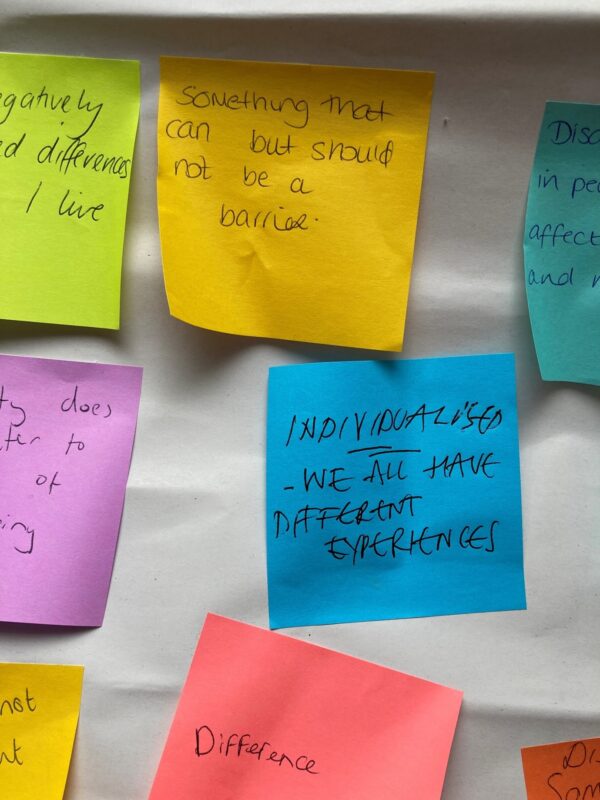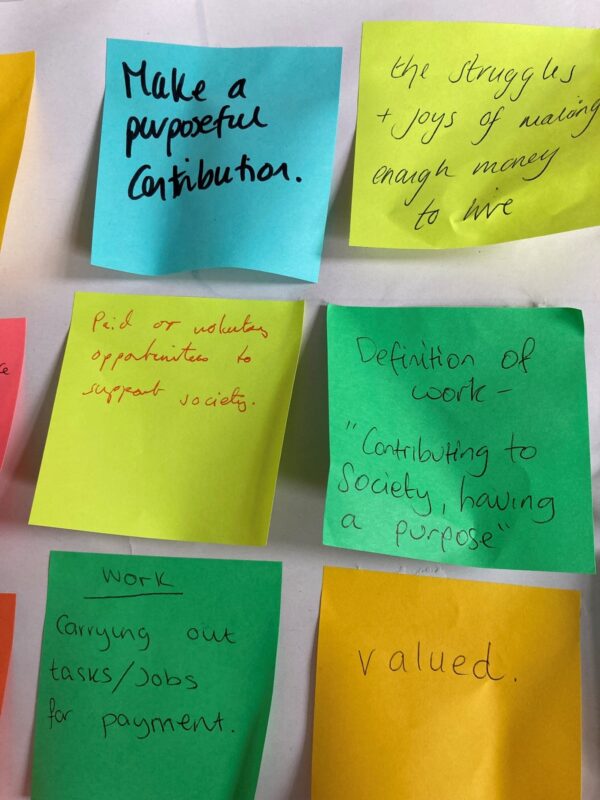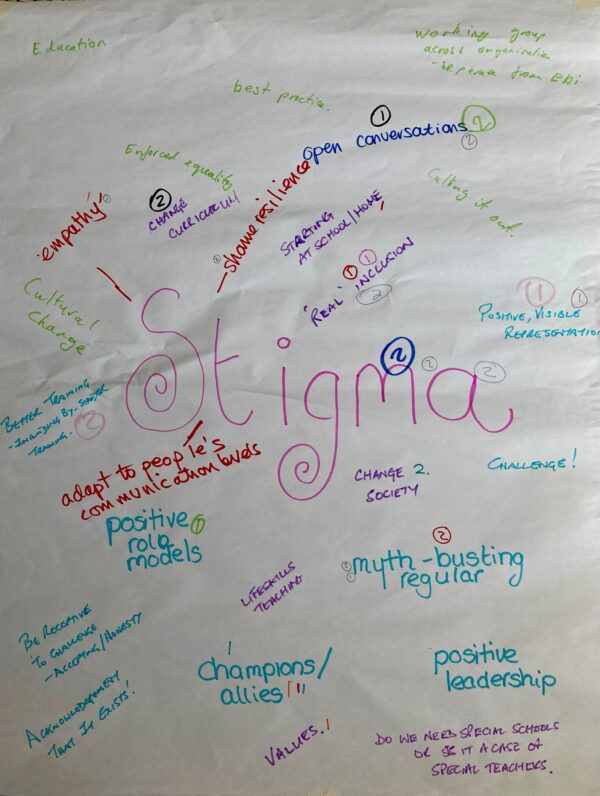In June, Difference North East hosted a Disability at Work Summit in Newcastle Upon Tyne. We brought together over 50 employers, policy makers, local authorities, academics, and disabled people to work together to wrangle with some of the big issues. The day was participatory, and every participant added their voice, expertise and vision to the lively discussions that emerged.
Our vision was to:
Foster an inclusive employment culture where disabled people enjoy equality at work.
Our goals were to:
- Influence regional strategies and services to better support disabled workers and job seekers.
- Promote good practice in the employment of disabled people in our region.
What we did:
- Explored barriers that prevent disabled people from enjoying equality in employment.
- Envisioned a more inclusive employment culture in the North East.
- Devised actions that we can start to take together to make this a reality
We asked the participants what they thought of when we talked about ‘Disability’ and when we talked about ‘Work’. Here’s what we came up with.
Disability is:
- ‘The negatively perceived differences to how we live’
 ‘Society does not cater to my way of functioning’
‘Society does not cater to my way of functioning’- ‘The world not ‘designed’ right to support a specific human beings needs’
- ‘Not all disability is visible!’
- ‘Something that can, but should not, be a barrier’
- ‘Individualised. We all have different experiences’
- ‘Difference’
- ‘Different ability’
- ‘Something that impacts ability day to day’
- ‘A part of someone, what makes them, them’
- ‘One aspect of the diverse human experience’
- ‘Difference from socially perceived ‘norm’
- ‘Difference in people that can affect in positive and negative ways’
- ‘Having an additional support need’
- ‘Physical or mental diversity which society and physical environment does not adapt to’
- ‘My difference. My identity’
- ‘Inclusion’
- ‘Resilience’
- ‘Physical or mental impairment that prevents or hinders everyday activities’
- ‘A physical, mental or neurological condition that has a regular impact on their life’
- ‘At odds with the world view’
- ‘Resilience’
Work is:
-
- ‘A place/space for anyone to contribute their skills etc. to’
- ‘Make a purposeful contribution’

- ‘Making a difference for others’
- ‘Purpose makes a difference’
- ‘Purpose’
- ‘Not all organisations have the training to train someone with a disability’
- ‘valued’
- ‘The struggle and joys of making enough money to live’
- ‘Paid or voluntary opportunities to support society’
- ‘Carrying out tasks/jobs for payment’
- ‘Effort + time = output’
- ‘Paid or voluntary opportunities’
- ‘How we make a living’
- ‘Providing a service. Producing a product. Helping an individual or group. Contributing to society. Unpaid or paid’
- ‘It’s a lot more than admin jobs’
- ‘Giving dedicated time to a productive task’
- ‘The central requirement to survival’
- ‘Hard’
- ‘Where you go to get paid, grow, socialise, be part of a community or social network’
- ‘Love it’
Key areas of work
During the Summit, we asked questions and set provocations around 3 key areas:
- Identifying barriers to enjoying equality in employment for disabled people
- Identifying what works well
- Planning for change
Here’s what we, as a group, found, and what we said we could do to change things.
Barriers to enjoying equality in employment for disabled people:
- Bias in recruiting managers
- No policy in place
- Cultural Change
- Stigma
- Application processes
- Hidden/Lack of role models- Aspiration
We dug deeper into some of these barriers to explore things that might already be working well, and what we could do to change things, mix things up, and push forward with equality.
Lack of Aspiration
Having positive disabled role models, taking positive action, and increased visibility of disabled people in employment came out as the top priorities.
These were followed by educating staff, managers and directors and implementing personalised support assessments.
‘‘Representation matters’’- summit participant
Some other things that came up were:
- Support needs to be realistic, and we need to manage expectations
- Acknowledge achievements
- Mentors
- How do we tackle unconscious bias? Do we need to put everyone at ease?
- Recognise disability as strengths
- Mix things up, have fun- share real stories of experience.
‘‘On Zoom, nobody knew I was a wheelchair user. I was promoted within a few months’’- summit participant
Rigidity/Non- Flexibility
Not making assumptions, talking to disabled people and inviting them into the conversation, and developing and adopting flexible recruitment methods and flexible working conditions came out as top priorities here.
Challenging mindsets and resistant managers, taking a bottom-up approach to finding solutions, and pushing for a cultural shift were of great importance too.
‘We need to overcome the ‘that’s the way we’ve always done it’ mindset’- summit participant
Some other things that came up were:
- Being creative with solutions
- Open communication- no jargon!
- Heeding lessons from home working during Covid-19: take hybrid approaches
- The freedom to change, without needing permission
- Inclusivity/ collaboration
- Design from a person perspective
Interview Techniques
The most important priorities for changing interview techniques came out as having disabled panel members, having multiple options available with information about interview questions, schedules, and names of interviewers available in advance.
There were lots of ideas for change put forward:
-
- Consider the environment you’re holding the interview in: Group? Zoom setup? Zoom?
- Provide access support for the whole process, might we need a taxi?
- Rethink ‘scenario’ questions
- Instead of CV’s and application forms, allow for other formats such as video application, voice notes, and work trials
- Diversify the panel
- Reduce waiting time for the result
- Think about communication styles, languages, and needs
- Use paid work trials so that applicants can demonstrate
- Provide reassurance
- Make sure interviewers are properly trained
- Provide interview questions in advance, in any format
Application Process
Training came out as a top priority here too. Make sure those doing the sifting and selection have the right knowledge and experience. Allowing people to apply in different formats and supplying Easy Read and visual applications as standard, were also prioritised.
These were followed by making sure that hands on work experience in a particular role is available and considered, flexibility, and organisations connecting and collaborating with one another to share support and best practice.
Some other things that came up were:
- Receiving the interview questions beforehand
- Offering a 1:1 meeting before the ‘official’ interview
- Be creative with application methods
- Have 16-hour posts as a standard option
- Don’t use jargon and ‘buzz words’
- Offer clear guidance
What next?
Some brilliant suggestions for action came out of the time we spent together. Here are some things that folk came up with:
- Coaching and leadership training for disabled people in employment
- Have honest conversations and speak out
- Don’t use ‘cost’ as an excuse to avoid accessibility and inclusion
- This is all doable- work through our circles of influence
- Develop and share best practice
- Collaborate
- Centre disabled voices rather than having ‘experts’ speak on disabled people’s behalf
- Promote positive representation of disabled people in work
- Change the work environment- not the person
- See adapting as an opportunity- jobs can be done in different ways!
- Create disabled staff networks, and working groups across the organisation- separate from EDI
- Have ‘myth busting’ sessions every week and have champions and advocates in place
- Have a Disability Policy in place which should include; Established accountability, reasonable adjustments, necessity for individualised support/ arrangements and sickness and absence procedures,
- All senior managers should receive bias training and continuous professional development
- Change the curriculum in educational institutions
There were many other comments about how coming together like we did, helped build feelings of solidarity and validation and we left with a renewed energy to make change happen. We committed to taking our learning into the organisations we work with and for. But…we ended the day with one major question:
How do we get this to employers?
So, this is our next step. We would like to invite participants to come back together to watch a short film and discuss our findings at an event in September. We want to come up with some strategies for making change happen in our region. We will be hosting an in-person get together, as well as as a separate one online via Zoom. We will send details out when we finalise these plans.
This summit was only the beginning of the work we can do together. We want to the North East to be the most inclusive place for disabled people to work. One way to help do this is to join us as a member to join the fight in ending disability discrimination. You can also join our Allies Network and help develop best practice where you work.
You can contact us with any questions or suggestions about these findings.
nic@differencenortheast.org.uk
 .
.
